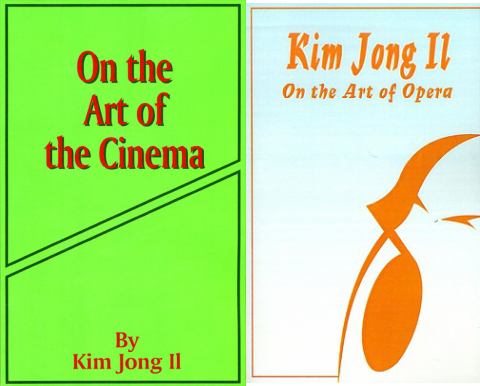Kim Jong-Il (1941–2011), son of North Korea’s despotic Kim Il-sung and a tyrant in his own filial right, had as many titles as he did talents, with honorifics including the Sun of the Nation and the Shining Star of Paektu Mountain. Highfalutin nicknames aside, the younger dictator was a pretty able guy. North Korean sources assert that the Dear Leader once shot a 38 under par with 11 birdies (in his first and only game of golf), and could alter the weather using the power of his mind. Having turned his intellect to academia, Kim wrote 1500 books while studying at university. He also theorized extensively about art, cinema, and opera.
Kim once served as the Movie and Arts Division Director in North Korea’s Propaganda and Agitation Department, and was a renowned cinephile. As befitting a man whose personal video library reportedly housed over 20,000 titles, Kim (or some unfortunate ghostwriters) published numerous lectures and pamphlets on film, some of which are available in the Democratic Republic of Korea’s E‑Library. In his text The Cinema and Directing, for example, Kim shows off his talents for writing stilted academic prose while discussing ideology:
The ideological kernel of a production is the seed which the director and all the other creative workers should bring into flower through their collective efforts and wisdom. It is not only the basis of the interpretation by the individual creative workers, but also the foundation on which they all combine to produce one single cinematic presentation. When all interpretations are conducted on the basis of one seed, they form the components of one cinematic presentation because they are built on the same foundation [et cetera, ad nauseum].
Kim also pontificated on matters of literature. The treatise, entitled Life and Literature, offers the Ever-Victorious, Iron-Willed Commander’s thoughts on the essence of writing:
Literature belongs to the domain of humanics [sic]. The essential characteristic of literature as a humanics [sic] consists of describing real people and serving man… To say that literature portrays people means that it describes people and their lives, people who live, breathe, think and act as they do in real life. That literature serves man means that it solves urgent and important human problems through people and their lives and thus teaches them what life is and influences them to lead an honourable life. It is only through an accurate portrayal of people and their lives that literature can provide proper solutions for valuable human problems, and exert a great influence on people.
The key words here are “people” and “lives.” Got it?
Lest you dismiss these writings as pseudo-intellectual nonsense, it’s important to note that some philosophical interpretation is required. It’s the meanings behind the words, and the things that Kim leaves unsaid, that make up the real meat and potatoes of the piece… Or something.
You can find more of Kim Jong-il’s writings (alongside those of his father, Kim Il-sung) at the Democratic Republic of Korea E‑Library. Other titles include On the Art of the Drama and On the Art of Opera, which gets some pretty stellar reviews on Amazon. Take for example: “With over five books published per year in North Korea, it is a challenge to pick a single favorite. However, this book is a standout for North Korean opera connoisseurs and beginners alike.”
Ilia Blinderman is a Montreal-based culture and science writer. Follow him at @iliablinderman.
Related Content:
North Korea’s Cinema of Dreams
A Slo-Mo Look Inside North Korea
Orchestral Manoeuvres in North Korea Prove Yet Again That Music is Universal



Criticizing the style of any writing translated from its original language is rather useless.
The crediting of thousands of various works to Kim-Jong-Il has to be seen in it’s proper cultural perspective and can’t be taken literally. Even only superfluous study of North Korea’s culture will show that.
Not to defend Kim-Jong-Il in any ways, but cheap shots do not educate or enlighten readers of ‘open culture’ in any ways. To the author of this article: why did you write it? What exactly is the point. Or, to quote you: “It’s the meanings behind the words, and the things that Ilia Blinderman (sic) leaves unsaid, that make up the real meat and potatoes of the piece… Or something.”
Exactly ;)
I have a dream for the divided Koreas. The two armies will assemble at Panmunjom.
PSY will sing “Gentleman” and make them laugh.
He will sing “Swan’s Dream” and make them cry.
He will sing “Gagnam Style” and make them dance.
And then, everyone will eat bulgogi.(Tastiest food in the world.)
Mass defection towards South. Problem solved.
CAN I ASK YOU SOMETHING ABOUT FREEDOM ?
movies ? how could movies affects the youth today ? isn’t it because of movies children become more rude ? became malicious at an early age?
television is one of the most common trends in media. and somehow , media became one of the roots why the new generations are so rude. but it depends upon the individuals.
thank you.
Hi, could you tell me the publisher and year of On the Art of Drama?
Thank you!